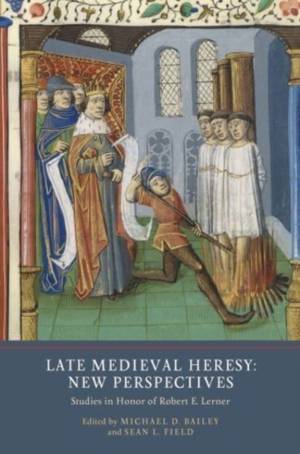
Vous voulez être sûr que vos cadeaux seront sous le sapin de Noël à temps? Nos magasins vous accueillent à bras ouverts. La plupart de nos magasins sont ouverts également les dimanches, vous pouvez vérifier les heures d'ouvertures sur notre site.
- Retrait gratuit dans votre magasin Club
- 7.000.000 titres dans notre catalogue
- Payer en toute sécurité
- Toujours un magasin près de chez vous
Vous voulez être sûr que vos cadeaux seront sous le sapin de Noël à temps? Nos magasins vous accueillent à bras ouverts. La plupart de nos magasins sont ouverts également les dimanches, vous pouvez vérifier les heures d'ouvertures sur notre site.
- Retrait gratuit dans votre magasin Club
- 7.000.0000 titres dans notre catalogue
- Payer en toute sécurité
- Toujours un magasin près de chez vous
Late Medieval Heresy: New Perspectives
Studies in Honor of Robert E. Lerner
177,45 €
+ 354 points
Description
Fresh investigations into heresy after 1300, demonstrating its continuing importance and influence. From the Gregorian reforms to the Protestant Reformation, heresies and heretics helped shape the religious, political, and institutional structures of medieval Europe. Within this larger history of religious ferment, the late medieval period presents a particularly dynamic array of heterodox movements, dissident modes of thought, and ecclesiastical responses. Yet recent debates about the nature of heresy in the twelfth and thirteenth centuries have too easily created an impression of the period after 1300 as merely an epilogue to the high medieval story.
This volume takes the history of heresy in late medieval Europe (1300-1500) on its own terms. From Paris to Prague and fromnorthern Germany to Italy and even extending as far as Ethiopia, the essays shed new light on a vibrant world of audacious beguines, ardent Joachites, Spiritual Franciscans, innovative mystics, lay prophets, idiosyncratic alchemists, daring magicians, and even rebellious princes locked in battles with the papacy. As befits a collection honoring the pioneering career of Robert E. Lerner, the studies collected here combine close readings of manuscripts andother sources with a grounding in their political, religious and intellectual contexts, to offer fresh insights into heresies and heretics in late medieval Europe. MICHAEL D. BAILEY is Professor of History at Iowa State University; SEAN L. FIELD is Professor of History at the University of Vermont. Contributors: Louisa A. Burnham, Elizabeth Casteen, Jörg Feuchter, Samantha Kelly, Richard Kieckhefer, Deeana Copeland Klepper, FrancesKneupper, Georg Modestin, Barbara Newman, Sylvain Piron, Justine L. Trombley.
This volume takes the history of heresy in late medieval Europe (1300-1500) on its own terms. From Paris to Prague and fromnorthern Germany to Italy and even extending as far as Ethiopia, the essays shed new light on a vibrant world of audacious beguines, ardent Joachites, Spiritual Franciscans, innovative mystics, lay prophets, idiosyncratic alchemists, daring magicians, and even rebellious princes locked in battles with the papacy. As befits a collection honoring the pioneering career of Robert E. Lerner, the studies collected here combine close readings of manuscripts andother sources with a grounding in their political, religious and intellectual contexts, to offer fresh insights into heresies and heretics in late medieval Europe. MICHAEL D. BAILEY is Professor of History at Iowa State University; SEAN L. FIELD is Professor of History at the University of Vermont. Contributors: Louisa A. Burnham, Elizabeth Casteen, Jörg Feuchter, Samantha Kelly, Richard Kieckhefer, Deeana Copeland Klepper, FrancesKneupper, Georg Modestin, Barbara Newman, Sylvain Piron, Justine L. Trombley.
Spécifications
Parties prenantes
- Editeur:
Contenu
- Nombre de pages :
- 282
- Langue:
- Anglais
- Collection :
- Tome:
- n° 5
Caractéristiques
- EAN:
- 9781903153826
- Date de parution :
- 21-09-18
- Format:
- Livre relié
- Format numérique:
- Genaaid
- Dimensions :
- 156 mm x 234 mm
- Poids :
- 580 g






